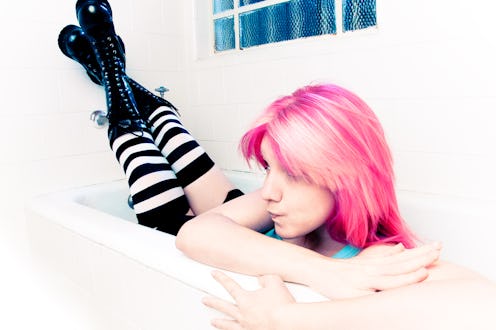Books
This App Scrubs Profanity From eBooks

Nearly every reader has, at one time or another, come across words, sentences, paragraphs, or even complete works of fiction that cause extreme discomfort. Now, tech-savvy readers now have the ability to exempt themselves from these particular kinds of uncomfortable interactions thanks to the technical wizardry of the free Clean Reader App, which rids e-books of profanity and in favor of a replacement word or phrase that offers the same general meaning.
By choosing either clean, cleaner, or squeaky clean, readers can scrub any of the 1 million-plus titles available for download via the app of any and all offensive material. According to the man behind the app, Jared Maughan, "The idea for Clean Reader started at our dinner table after our daughter's first exposure to books with swear words. It's taken significant time and effort to take it from an interesting idea to a really fantastic mobile app that we're excited to offer to the world," and if you're ready to take the anonymous tweets provided to the public at face value, this exact service is exactly what a certain subset of readers have been waiting for.
According to unnamed source number one, "Love this app!! Thanks so much! Love to read but don't like the profanity some use.” Unnamed Twitter source number two adds, “This app has brought me back to reading and loving books again, Best app ever!!”
My own Twitter search reflected a different sort of sentiment — one that more closely reflects my own feelings about this app, I'd call it the WTF reaction.
Banned books week is still many months away, but the release of this app made break out the red marker and circle the date on my calendar (yep, I'm an analogue gal), because now that we as readers have the power to hide what we don't like in literature, it's more important than ever to celebrate freedom of speech and to take the time to wrestle with the hard truths that literature so often throws our way.
Surely there are elements of the way we speak, write and live that are uncomfortable, perhaps even unnecessary, and just maybe those more profane parts of the lived experience are pure filler filth, but I believe how we talk can tell us something about who we are. Literature ought to reflect the lived experience, which is exactly why reading a text like the Adventures of Huckleberry Finn in the original is so vital — it ensures that we have the hard conversations about how we have talked about one one another in the past and what that mean today. If we scrub profanity from our reading material, we're simply closing our eyes, plugging our ears, and pretending that those parts of the the literary experience that make us uncomfortable simply don't exist. While that certainly is one way to go, in my experience hiding from the truth never helped anyone.
I understand the sentiment behind the app— there are pages in many books that I flip quickly past, paragraphs I skip, and even entire chapters that I'll never re-read, so I can see how beautifully easy it would be to simply erase those dirty bits from my daily read. But, wouldn't it be preferable to have the tough conversations about the way we talk to one another, and the way our language can marginalize, offend, or abuse the people around us rather than simply blacking out our reading material?
Although every reader can and should make the choice for herself, I'm for honesty at all costs, even if the price is a little (or a lot) of discomfort.
Image: Marimoon/Flickr